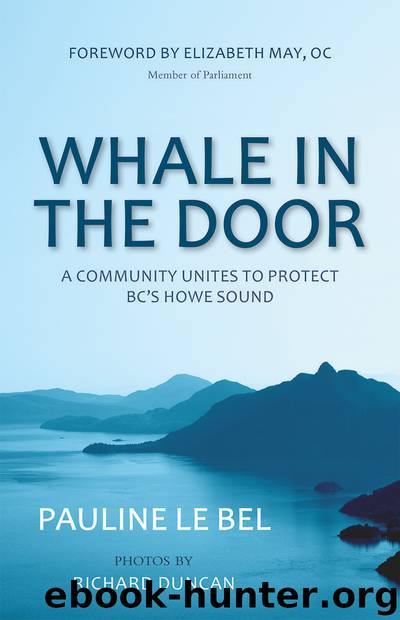Whale in the Door by Pauline Le Bel

Author:Pauline Le Bel
Language: eng
Format: epub
Tags: Howe Sound, British Columbia, Environmental conditions, Social life and customs, History
ISBN: 9781987915679
Publisher: Caitlin Press
Published: 2020-03-13T00:00:00+00:00
* * *
Reconciliation is about relationship, about living together with respect. Respect for people, respect for the land. When you respect the land and the waters, you get such a tremendous tailwind from the ancestors. You move better and smarter. You make good decisions. Doesn’t matter what you call her—Nature, the Environment, the Planet, Pachamama. It’s all the same. Mother Earth is what nourishes your existence every moment of your life.
* * *
The acclaimed author and conservationist Roderick Haig-Brown (1908–76) said there were two kinds of citizens in North America: “the Boomers and the Stickers.” The Boomers were “those who pillage and run and want to make a killing and end up on Easy Street.” The Stickers want “to settle and love the life they have made and the place they have made it in.” Fortunately, most of the people I have met on this Howe Sound journey are Stickers.
I find inspiration in the words of Robin Kimmerer, Professor of Environmental and Forest Biology at the State University of New York College of Environmental Science and Forestry. She draws on both Indigenous knowledge—her grandfather was a member of the Potawatami Nation—and her scientific knowledge as a plant ecologist. In her TED talk, “Reclaiming the Honorable Harvest,” she presents a model based on Indigenous wisdom for living well on the land. “Demand an economy that is aligned with life,” she says, “not stacked against it. Becoming Indigenous to a place means living as if your children’s future mattered, to take care of the land as if our lives, both material and spiritual, depended on it.”
The honourable harvest demands that we ask permission of the land before taking anything, that we listen for the answer, that we take only what we need and waste none of it, that we minimize harm and share the harvest. Most of all that we acknowledge our gratitude. Social, political and economic decisions based on the honourable harvest could lead to an enhanced future for generations to come. “We have chosen the policies we live by,” Kimmerer says. “We can choose again.”
Download
This site does not store any files on its server. We only index and link to content provided by other sites. Please contact the content providers to delete copyright contents if any and email us, we'll remove relevant links or contents immediately.
Fanny Burney by Claire Harman(26597)
Empire of the Sikhs by Patwant Singh(23074)
Out of India by Michael Foss(16849)
Leonardo da Vinci by Walter Isaacson(13319)
Small Great Things by Jodi Picoult(7122)
The Six Wives Of Henry VIII (WOMEN IN HISTORY) by Fraser Antonia(5505)
The Wind in My Hair by Masih Alinejad(5092)
A Higher Loyalty: Truth, Lies, and Leadership by James Comey(4954)
The Crown by Robert Lacey(4807)
The Lonely City by Olivia Laing(4799)
Millionaire: The Philanderer, Gambler, and Duelist Who Invented Modern Finance by Janet Gleeson(4469)
The Iron Duke by The Iron Duke(4350)
Papillon (English) by Henri Charrière(4263)
Sticky Fingers by Joe Hagan(4188)
Joan of Arc by Mary Gordon(4103)
Alive: The Story of the Andes Survivors by Piers Paul Read(4023)
Stalin by Stephen Kotkin(3958)
Aleister Crowley: The Biography by Tobias Churton(3634)
Ants Among Elephants by Sujatha Gidla(3463)
